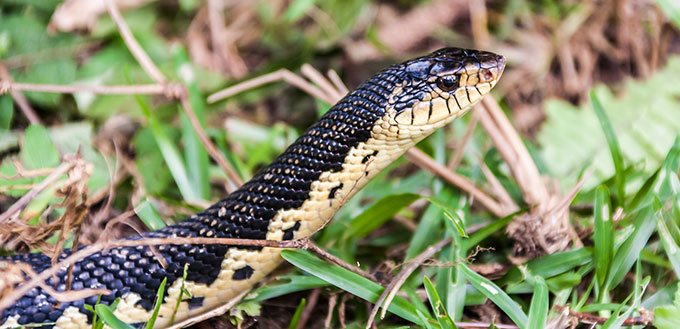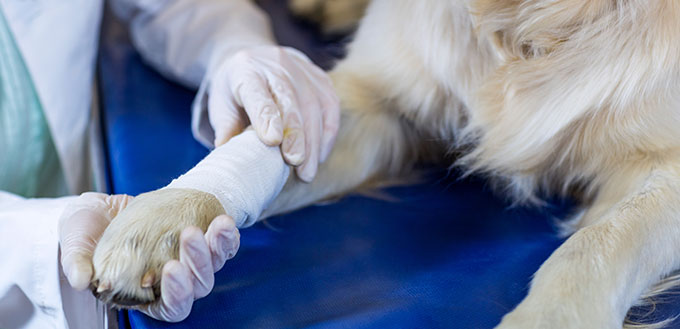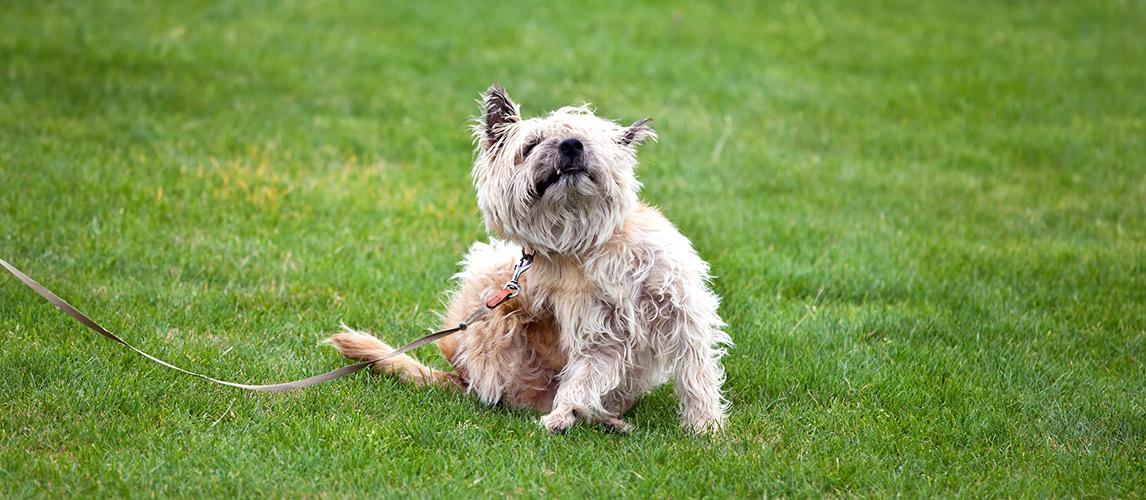Dogs are adventurous animals and love to run wild in the outdoors. Most often, their playful and social behavior gets them in danger. One of these dangers is snakes. This article will help you to become better informed about snake bites on dogs, what to know, and what to do if ever you find your dog in this situation.

When Doggie Play Becomes Dangerous
Snakes are everywhere. For centuries now, they have been able to adapt to their surroundings and go unnoticed by people around unless spotted. When they bite, they become threatening and risky to victims.
Most pups are social pets and wouldn’t shy away from being around other animals. They would look for an opportunity to play with a new animal or pet that comes around. Due to their playful nature, they would not mind being in the company of a snake. Now, this is where the problem lies.
Unknown to your pup, snakes are quite dangerous, and a single bite from a venomous one would be life-threatening. At all times, you should have an idea of what to do when this happens, and this article has just the answers.
When and Where Do Snake Bites Occur?
Snakes are highly intelligent animals and can live anywhere. They are around many uninhabited and even inhabited dwellings. For their ability to quickly adapt, you would find it difficult to know whether you have one around you, they are good at being quiet.
Now what is certain is that although snakes can be around almost all the time, they are usually dormant in cold seasons. They are lively and tend to inflict more bites around the warm seasons, which is between March to October each year. They are very active around this time when they have returned from hibernation. Nevertheless, you should not rule out the possibility of also biting your pets during the cold season when they come into contact with them.
Snakes are mostly in the outdoors and can disguise themselves in some bushes nearby without your notice. They are around and near water sources like lakes, rivers, and even ponds. When you take your Dog out to such areas, you should have an eye out. It is likely to cross paths with snakes.
Some snakes whose venom can be harmful to your pups are rattlesnakes, copperheads, water moccasins, and a whole lot. At all times ensuring safety should be a priority especially when you take your pet to the outdoors.

Symptoms of Snake Bites in Your Dog
Snake bites can be harmful and deadly for your dog and pet in general. The effect of a snake bite largely rests on the maturity of the snake. The older it is, the more venom it has in its fangs, and the more dangerous it is to your dog.
Thanks to their furs, dogs have protection from bites, and injuries, thus snake bites are inflicted in areas around the head and the neck.
Some symptoms to look out for with regards to bites on your pups are detailed here.
- Bruises and swelling: Should your dog have a bruise or a small swell on its body, it could be from the bite of a snake. Such a symptom is usually associated with non-venomous snakes, and your vet should treat it with proper care. This would prevent long term effects of the snake bites from ever settling in.
- General bleeding: You are likely to see some level of bleeding from bruises and wounds on your dog after a bite. Attention and medical advice should be sorted to tend to wounds as it may have some adverse effects on your dog.
- Weakness: If your dog suddenly experiences weakness and isn’t as active and lively as it usually is, you should check for a snake bite. Weakness, especially in the limps (tetraparesis), is sometimes due to snake bites. Venom from these bites paralyzes your pup and makes it weak.
- Dilated Pupils: Does your dog’s eye look dilated and unresponsive to light? A sign that your dog has been bitten by a snake can be seen right in the eye. Your dog’s eye should look lively and responsive, if this is not the case you should see a Vet.
- Pain: After a bite from a snake, one immediate sign or symptom you will see your dog show is intense pain. Venom from bites can put your dog in so much pain and should be treated as soon as possible.
- Paralysis and Coma: These are some of the main long term effects of snake bites in dogs. Venoms from bites depending on how close they are to their heart are dangerous. If not attended to immediately, can cause paralysis to your pup or even put it into a coma.
Other symptoms your Dog may show as a result of bites include;
- Blood in urine
- Tremors
- Slow breathing
- Vomiting
- Contraction of muscles
What to Do When Your Dog Gets Bitten
Your dog may be showing some signs of snake bites from the signs and symptoms stated above. Should you feel like your pup has been bitten by a snake, here are some of the things to do.
- Keep calm – You love your dog and can’t handle seeing it in pain. There is a high possibility of being anxious and worried. Being worried doesn’t and wouldn’t solve the problem. You should be calm in order to take measures that won’t come out in a rush.
- Minimize the movement of your dog – Having your dog move around doesn’t help the situation. Movement only aggravates the situation. Even as you are calm, it is also good to keep your pet calm.
- See your vet as soon as possible – Don’t wait to see whether the signs would subside. You should immediately see a vet when your dog gets bitten.
A vet is the best option for you and your pup when you are in a situation such as this. A proper diagnosis would be made for your dog to receive the best treatment.
- Do not try home remedies – Well, you may in a momentary lapse of time want to try some home remedies for your dog. It is advisable not to attempt that at all. This could bring serious health risks for your pet and worsen the pain it may go through.

Treatment for Bites
As mentioned already, seeing your Vet when your pup gets bitten by a snake goes a long way to ease their pain and heal them.
These are some of the common ways of treatment your vet is likely to prescribe for your dog;
- Examination of your dog to be sure of the right prognosis for it. Before your Vet prescribes any method of treatment, the first step to recovery comes from diagnosis. The proper examination helps your Vet determine the best way to treat your pup.
- Using antibiotics, anti-inflammatory drugs and others to heal the wounds and bruises of dogs. This is mainly for bites that are not from venomous snakes. It would reduce swelling and also lessen the pain your dog may be facing.
- Cleaning the area of the dog that is affected. Your vet upon noticing signs of a snake bite would clean the areas affected to prevent other infections.
- Anti-venom prescription. Anti-venom is for dogs that have been bitten mostly by venomous snakes. An anti-venom is administered to alleviate the effects of the bite and help your dog recover.
- Depending on how severe the bite is, your dog may be given some IV fluids or even placed on oxygen support to help it recover.
What to Do to Prevent Snake Bites
There’s a saying which is almost a cliché, and it says; prevention is better than cure. Indeed taking steps to prevent yourself and your dog from being bitten is always great.
These are some practical methods to help you prevent snake bites on your pets.
- Keep your surroundings tidy and neat at all times – Snakes make a home in uninhabited areas including places that are unkempt and dirty. These areas become breeding and dwelling places for them. Overgrown bushes around you should be trimmed, and your surroundings should be kept clean all the times.
- Have your dog placed on a leash and keep an eye on it – The worst thing you want for your dog is to have it around a snake when you’re out for a picnic. Have your dog in eyesight especially when you go for a stroll, or walk.
- Stay on known and marked territories – Don’t veer off to places that are not cleared or known. Let your dog play in places you can locate and that are known to be free of snakes.
These simple precautions, when taken, would help keep your dog safe.
To Summarize
The venom if a snake contains deadly and potentially harmful toxins that could affect your dog. It is good to adhere to simple instructions and precautions that would keep you and your pet safe.
In the case of a bite, you should always seek an expert council. There’s no better expert with regards to your pet than the vet. A vet is your best friend when your pet gets bitten.
Immediate treatment should be sorted to help your dog survive such an ordeal. Most dogs survive and get well after a bite. Put measures in place and always make an effort to keep your dog safe.
Related Post: Best Liquid Bandage for Dogs
Sources:
- Lyndi L. Gilliam, DVM, North American Snake Envenomation in the Dog and Cat, Veterinary Clinics: Small Animal Practice
- Suchitra, B R, Clinical Management of Snake Bite in a Dog, ProQuest
- How to Give First Aid to Your Dog, HowStuffWorks
- Snake Bite Safety and Prevention for your Pets, WebMD
- Tammy Hunter, DVM, Snakebite Envenomization, VCA Hospitals
- What to Do During a Snake Encounter with Your Pets, The ASPCA







